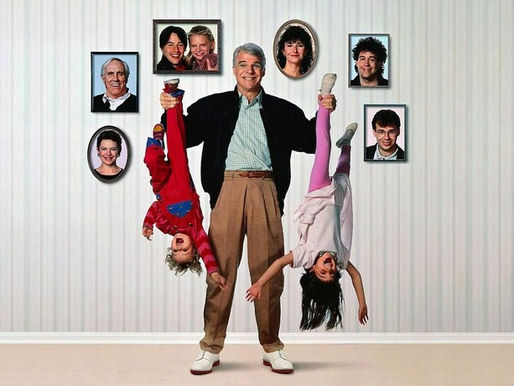top of page
Search
Comedy
Classic Comedy Films from 1930 - 1999


Dumbo (1941)
Of all the classic features to emerge from Walt Disney’s golden age of animation, Dumbo is perhaps the most paradoxical. It is at once the studio’s shortest feature and one of its most emotionally expansive. Born of necessity—crafted quickly and economically after the financial disappointment of Fantasia—Dumbo was never intended to be a major artistic statement.

Soames Inscker
5 min read


Lady and the Tramp (1955)
Few animated films have captured the essence of romance, charm, and Americana as completely as Walt Disney’s Lady and the Tramp. Released in 1955, this landmark feature was not only a narrative triumph but also a technical one—it was Disney’s first animated film presented in widescreen Cinemascope, giving an unprecedented sense of scale and intimacy to the studio’s storytelling.

Soames Inscker
5 min read


See No Evil, Hear No Evil (1989)
See No Evil, Hear No Evil (1989) is the third in a string of collaborative comedies between two of the most beloved comic actors of the 1970s and 1980s: Richard Pryor and Gene Wilder. Following the massive success of Silver Streak (1976) and the solid reception of Stir Crazy (1980), this film attempted to capitalize on their proven chemistry with a high-concept premise—two men, one blind and the other deaf, unwittingly caught in a murder and jewel-smuggling plot.

Soames Inscker
5 min read


Three Amigos! (1986)
Released in 1986 and directed by John Landis, Three Amigos! is a comedic Western that brings together three of the biggest comedy stars of the era—Steve Martin, Chevy Chase, and Martin Short—in a spoof that lovingly pokes fun at silent film-era heroes, Mexican Western tropes, and the inflated egos of Hollywood performers.

Soames Inscker
5 min read


Roxanne (1987)
Roxanne (1987) is a romantic comedy that wears its intelligence—and its heart—on its sleeve. Written by and starring Steve Martin, and directed by Fred Schepisi, the film is a modern reimagining of Edmond Rostand’s 1897 play Cyrano de Bergerac, transporting the story of the eloquent, big-nosed hero into a quirky American mountain town in the 1980s.

Soames Inscker
4 min read


Trains, Planes and Automobiles (1987)
Directed, written, and produced by John Hughes, Planes, Trains and Automobiles (1987) is more than just a holiday road-trip comedy—it’s a poignant character study, a razor-sharp social satire, and one of the most beloved films of the 1980s.

Soames Inscker
4 min read


Parenthood (1989)
Released in 1989, Parenthood is a comedy-drama that manages the rare feat of being both sharply observational and warmly human. Directed by Ron Howard and based on a story developed with screenwriters Lowell Ganz and Babaloo Mandel, the film explores the messy, imperfect, and profoundly emotional world of raising children—and being raised in turn—across multiple generations of one extended family.

Soames Inscker
5 min read


Uncle Buck (1989)
Uncle Buck (1989) is a quintessential John Hughes film: heartfelt, hilarious, and sharply observant of both adult and adolescent growing pains. It’s also a career-defining vehicle for the late, great John Candy, whose turn as the bumbling but lovable title character transformed a potentially one-note comedic premise into a deeply resonant portrait of family, responsibility, and redemption.

Soames Inscker
4 min read


Shirley Valentine (1989)
Shirley Valentine (1989), directed by Lewis Gilbert and based on Willy Russell’s acclaimed stage play, is a poignant, funny, and quietly radical portrait of a woman reclaiming her identity after years of domestic invisibility.

Soames Inscker
4 min read


The Taming of the Shrew (1967)
Franco Zeffirelli’s 1967 adaptation of William Shakespeare’s The Taming of the Shrew is a riotous, visually extravagant, and unashamedly theatrical film. Starring Richard Burton and Elizabeth Taylor at the height of their volatile real-life romance, the film turns the Bard’s problematic comedy into an electrifying battle of the sexes, a lush Renaissance spectacle, and a showcase for its leading couple’s magnetic chemistry.

Soames Inscker
4 min read


The Prince and the Showgirl (1957)
The Prince and the Showgirl is a unique cinematic artifact, notable not only for its content but for the behind-the-scenes drama that surrounds its production. Directed by and starring Laurence Olivier and co-starring Marilyn Monroe, the film represents a collision of Old World theatrical gravitas and New World Hollywood charisma.

Soames Inscker
4 min read


Houseboat (1958)
Few films of the late 1950s capture the intersection of glamour, family comedy, and romantic fantasy quite like Houseboat (1958). At its core, this is a classic romantic comedy wrapped in the trappings of post war family life, delivered with a dash of European elegance and American sentimentality.

Soames Inscker
5 min read


Every Girl Should Be Married (1948)
In the golden age of romantic comedies, Every Girl Should Be Married (1948) stands out as a brisk, bright, and mischievously subversive entry. Directed by Don Hartman and starring Cary Grant alongside Betsy Drake—who would later become his real-life wife—the film explores courtship, gender roles, and the institution of marriage with a humorous, lightly satirical touch.

Soames Inscker
5 min read


Operation Petticoat (1959)
Blending wartime antics with sharp comedy and a splash of romantic absurdity, Operation Petticoat (1959) is one of the most endearing military comedies to emerge from the post-World War II era. Directed by the rising star Blake Edwards, produced by Robert Arthur, and starring Cary Grant and Tony Curtis, this film delivers a buoyant mix of slapstick, satire, and character-driven humour—anchored in one of the most outlandish premises of any WWII film: a pink submarine.

Soames Inscker
4 min read


Indiscreet (1958)
Elegant, witty, and drenched in mid-century glamour, Indiscreet (1958) is a prime example of sophisticated romantic comedy done right. Directed with charm and breezy precision by Stanley Donen (of Singin’ in the Rain fame), and boasting the incomparable chemistry of Ingrid Bergman and Cary Grant, the film is a delightful blend of grown-up mischief, theatrical flair, and continental style. Based on Norman Krasna’s 1953 play Kind Sir, it manages to feel both timeless and distin

Soames Inscker
4 min read


Doctor Dolittle (1967)
When Doctor Dolittle premiered in 1967, it aspired to be the next great Hollywood musical extravaganza in the tradition of My Fair Lady and The Sound of Music. With Rex Harrison reprising his unique brand of speak-singing charm, lavish production values, and exotic locales, 20th Century Fox mounted a grand, ambitious adaptation of Hugh Lofting’s beloved children’s books.

Soames Inscker
5 min read


Ferris Bueller's Day Off (1986)
Few films have captured the spirit of teenage defiance and the fleeting freedom of youth like Ferris Bueller’s Day Off. A dazzling blend of comedy, charm, and subtle introspection, John Hughes' 1986 masterpiece is more than a simple high school lark—it’s a love letter to living in the moment.

Soames Inscker
4 min read


The Anniversary (1968)
The Anniversary (1968) is a darkly comic, offbeat British film that delivers a masterclass in screen villainy through a deliciously wicked performance by Bette Davis. Adapted from the play by Bill MacIlwraith, the film blends elements of domestic drama, grotesque comedy, and psychological torment.

Soames Inscker
5 min read


Kelly's Heroes (1970)
Released in 1970, Kelly’s Heroes stands as one of the most peculiar and entertaining war films ever made—a mash-up of gritty World War II action, heist movie caper, anti-authoritarian satire, and irreverent comedy. Directed by Brian G. Hutton, who previously helmed the more traditional WWII thriller Where Eagles Dare (1968), Kelly’s Heroes offers a tonal shift from straightforward valour to something far more subversive and eccentric.

Soames Inscker
5 min read


Superman III (1983)
Superman III is the third entry in the original Superman film series, and by far the most divisive. Released in 1983 and directed solely by Richard Lester—who had completed the second film after Richard Donner's departure—it steers sharply into comedic territory, diluting the mythic and emotional tone of the earlier films in favour of slapstick, satire, and an awkward tech-paranoia subplot.

Soames Inscker
5 min read
bottom of page


